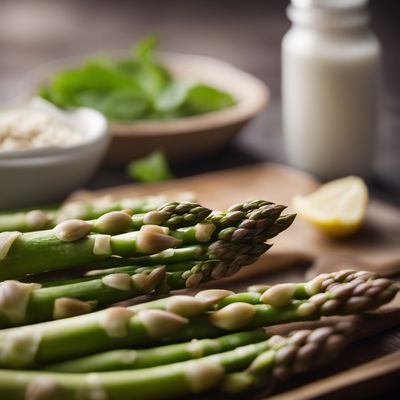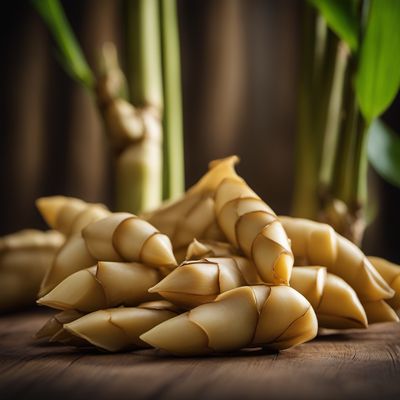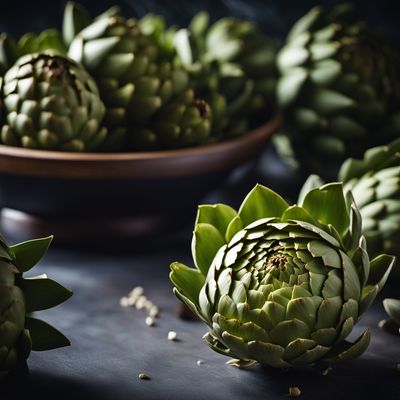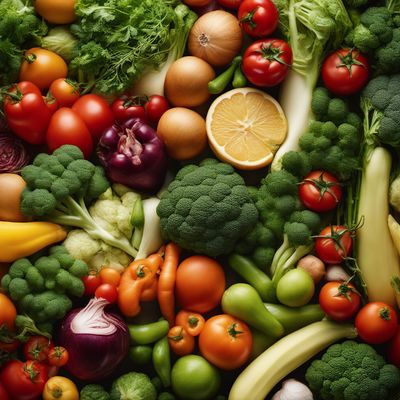
Ingredient
Stems/stalks eaten as vegetables
Versatile Veggie Stems
Stems and stalks, such as asparagus, celery, and broccoli, are commonly used as vegetables in culinary preparations. They add crunch, color, and a range of flavors to salads, stir-fries, soups, and more. These edible parts of plants offer a wealth of nutrients and contribute to a well-balanced diet.
Origins and history
The tradition of consuming stems and stalks as vegetables dates back centuries, with different cultures incorporating them into their cuisines. In many Asian countries, vegetables like bok choy and gai lan have been staples for centuries. European cuisines also feature various stem vegetables, such as asparagus and celery. The popularity of these ingredients has grown worldwide due to their versatility and health benefits.
Nutritional information
Stems and stalks are low in calories and rich in essential nutrients. They are excellent sources of dietary fiber, vitamins A, C, and K, as well as minerals like potassium and folate. Incorporating these vegetables into meals can support overall health and contribute to a balanced diet.
Allergens
There are no known allergens specifically associated with stems and stalks as vegetables. However, individuals with allergies to specific vegetables should exercise caution and consult with a healthcare professional if necessary.
How to select
When selecting stems and stalks, look for firmness and vibrant colors. Avoid any signs of wilting, discoloration, or soft spots. For asparagus, choose spears with tightly closed tips and firm stalks. Celery should have crisp stalks and fresh leaves. Broccoli stems should be firm and free from blemishes. Opt for organic or locally sourced options when possible to support sustainable farming practices.
Storage recommendations
To maintain the freshness and quality of stems and stalks, store them properly. Asparagus can be kept in the refrigerator, standing upright in a glass of water, covered with a plastic bag. Celery should be wrapped in aluminum foil or stored in a perforated plastic bag in the refrigerator's crisper drawer. Broccoli stems can be stored in a plastic bag in the refrigerator for up to a week. Use them as soon as possible for the best flavor and texture.
How to produce
Growing stems and stalks as vegetables can be done in a home garden or even in containers. Research the specific vegetable's growing requirements, such as sunlight, soil conditions, and watering needs. Many stem vegetables, like celery and asparagus, require patience as they take time to mature. Follow proper planting and care instructions to ensure a successful harvest.
Preparation tips
Stems and stalks can be prepared in various ways depending on the vegetable. Asparagus can be steamed, roasted, grilled, or sautéed. Celery is commonly used in salads, soups, and stir-fries, but can also be stuffed or braised. Broccoli stems can be peeled and sliced for stir-fries, pickled, or used in slaws. Experiment with different cooking techniques to bring out the best flavors and textures of these versatile vegetables.
Culinary uses
Stems and stalks are widely used in a variety of culinary applications. Asparagus is often enjoyed on its own as a side dish, in salads, or incorporated into pasta dishes. Celery is a staple in soups, stews, and stocks, and also adds crunch to salads and sandwiches. Broccoli stems can be used in stir-fries, soups, and even grated into vegetable patties. These vegetables offer endless possibilities in both vegetarian and non-vegetarian dishes.
Availability
Stems and stalks as vegetables are commonly available in grocery stores, supermarkets, and farmers markets worldwide.
More ingredients from this category » Browse all

Asparagus and similar-
The Versatile Spear

Leeks and similar-
The Versatile Alliums

Celeries and similar-
The Versatile Celery: A Crunchy and Nutritious Delight

Bamboo shoots and similar-
The Delicate Delights of Bamboo

Rhubarbs and similar-
The Tart Delight

Sago palm
The Versatile Sago Palm

Florence fennels and similar-
The Delicate Delight: Unveiling the Versatility of Florence Fennel

Palm hearts and similar-
The Delicate Delights of Palm Hearts: Nature's Tender Gems

Globe artichokes and similar-
The Art of Artichokes

Other Stem vegetables
"The Unsung Heroes: Exploring the World of Stem Vegetables"

Cardoons and similar-
The Artichoke's Cousin: Exploring the Versatile World of Cardoons

Kohlrabies and similar-
The Versatile and Crunchy Delight: Kohlrabies and Their Kin
